 10 citations,
January 2019 in “Archives of Endocrinology and Metabolism”
10 citations,
January 2019 in “Archives of Endocrinology and Metabolism” Testosterone therapy may slightly increase sexual desire in women with HSDD but lacks broad recommendation due to safety concerns and limited approval.
[object Object]  8 citations,
March 2020 in “Aesthetic Plastic Surgery”
8 citations,
March 2020 in “Aesthetic Plastic Surgery” Finasteride and minoxidil together safely and effectively increase hair growth and density for androgenetic alopecia.
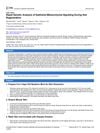 6 citations,
February 2013 in “Journal of Visualized Experiments”
6 citations,
February 2013 in “Journal of Visualized Experiments” The method quickly analyzes hair growth genes and shows that blocking Smo in skin cells stops hair growth.
 2 citations,
April 2017 in “Plastic and Aesthetic Nursing”
2 citations,
April 2017 in “Plastic and Aesthetic Nursing” Platelet-rich plasma therapy shows promise for hair regrowth in alopecia patients.
2 citations,
May 2015 in “International Journal of Scientific Reports” Neonatal mesenchymal stem cell therapy shows promise for treating hair loss but needs more research.
1 citations,
January 2009 in “Elsevier eBooks” Lasers can reduce hair growth but may also damage skin.
 1 citations,
May 2004 in “Journal der Deutschen Dermatologischen Gesellschaft”
1 citations,
May 2004 in “Journal der Deutschen Dermatologischen Gesellschaft” The meeting presented new findings on hair stem cells, pigmentation, genetics, and modern hair treatment techniques.
 September 2024 in “Journal of Education Health and Sport”
September 2024 in “Journal of Education Health and Sport” PRP therapy can help regrow hair and improve hair thickness.
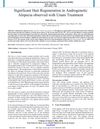 May 2024 in “International journal of science and research”
May 2024 in “International journal of science and research” Unani treatment significantly regrows hair in young adults with androgenetic alopecia.
 April 2024 in “Archiv EuroMedica”
April 2024 in “Archiv EuroMedica” Platelet-Rich Plasma therapy helps increase hair density and regrowth for some types of hair loss.
 January 2024 in “Materials chemistry frontiers (Online)”
January 2024 in “Materials chemistry frontiers (Online)” New near-infrared OLED emitters are more efficient, especially platinum(II) complexes, and have promising applications like hair growth treatment.
 November 2023 in “Journal of Student Research”
November 2023 in “Journal of Student Research” New treatments like low-level laser therapy, platelet-rich plasma therapy, and micro needling show positive results for hair regrowth in people with genetic hair loss.
[object Object]  September 2023 in “Gynäkologische Endokrinologie”
September 2023 in “Gynäkologische Endokrinologie” Menopause causes skin and hair to become drier and thinner, but hormone therapy can improve these conditions.
February 2022 in “INTERNATIONAL JOURNAL OF SCIENTIFIC RESEARCH” Home-based laser devices are effective for hair removal, skin rejuvenation, and stimulating hair growth, but more research is needed on their safety and long-term effects.
 November 2021 in “Current Otorhinolaryngology Reports”
November 2021 in “Current Otorhinolaryngology Reports” New treatments for hair loss could involve using stem cells and a process called the Wnt/beta-catenin pathway to stimulate hair growth.
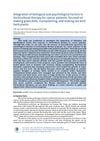 July 2019 in “Acta horticulturae”
July 2019 in “Acta horticulturae” Horticultural therapy helped cancer patients feel hopeful and positive about their disease experience.
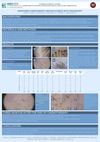
More research is needed to understand chemotherapy-induced hair loss and its phases.
 October 2018 in “InTech eBooks”
October 2018 in “InTech eBooks” The gene Foxn1 is important for hair growth, and understanding it may lead to new alopecia treatments.
 July 2018 in “Elsevier eBooks”
July 2018 in “Elsevier eBooks” New hair loss treatments show promise, but more research is needed to confirm their effectiveness.
 January 2018 in “Journal of general practice”
January 2018 in “Journal of general practice” Young people are losing hair due to stress, poor diet, pollution, and lack of sleep, but it can be treated with supplements and scalp treatments.
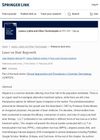 January 2018 in “Clinical approaches and procedures in cosmetic dermatology”
January 2018 in “Clinical approaches and procedures in cosmetic dermatology” Low-Level Laser Therapy might be an effective alternative hair loss treatment for some people.
 November 2015 in “Hair transplant forum international”
November 2015 in “Hair transplant forum international” Early attempts at using cloned cells for hair transplants failed, but 3D cell growth showed some promise.
 October 2015 in “Regenerative Medicine”
October 2015 in “Regenerative Medicine” Two growth factors, PDGF and FGF2, can potentially be used together to grow enough cells for a hair loss treatment, but their exact function on human cells needs further confirmation.
 January 2012 in “Postgraduate obstetrics & gynecology”
January 2012 in “Postgraduate obstetrics & gynecology” Up to half of women by age 50 experience significant hair loss, with various types and treatments available.
December 2021 in “Vestnik Rossiĭskoĭ akademii meditsinskikh nauk / Rossiĭskaia akademiia meditsinskikh nauk” Personalized vitamin and trace element treatment improves hair density and reduces hair loss in men with early-stage androgenic alopecia.
 January 2019 in “Springer eBooks”
January 2019 in “Springer eBooks” PRP and LLLT can improve hair growth in AGA, but more research needed.
Mesotherapy with stem cells showed promising hair growth results in some patients with hair loss, but more research is needed.
27 citations,
May 2011 in “Journal of dermatology” Methylprednisolone pulse therapy works best for recent and specific types of severe alopecia areata.
18 citations,
August 2019 in “Clinical breast cancer” Local hormonal treatment for vulvovaginal atrophy is likely safe for women with estrogen receptor-positive breast cancer on aromatase inhibitors.
 3 citations,
April 2022 in “Clinical, Cosmetic and Investigational Dermatology”
3 citations,
April 2022 in “Clinical, Cosmetic and Investigational Dermatology” Different methods, including stress management, healthy diet, supplements, and treatments like minoxidil, can help hair grow back after COVID-19 related hair loss.






















